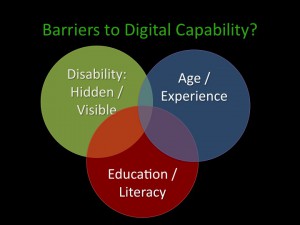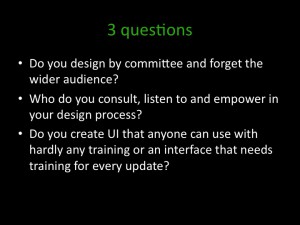Out of the blue, and as a complete surprise and compliment, I received a phone call and email asking me to participate in a talk about a proposed ‘Smart city’ initiative in Greenwich – this was part of Global Entrepreneur’s week apparently.
After a few late nights writing up some ideas, which came to nothing much, my worthy colleague John Sunderland and I discussed the matter, in a really long skype chat. It was really needed! As a result it became a reflective piece of work – I know what I do in visiting people with physical disabilities through developing my methodology over the years. It is built upon good training / teaching practice, and incorporates the development of capability, as I don’t talk too much about what people can’t do, I focus on their capabilities and abilities.
Here is the presentation I used for the event, and I think it useful to talk about a number of observations concerning the idea of a Smart City.
What is a Smart City?
I wanted to have an understanding of the term, and as such searches were made. Found plenty of corporate driven information (propaganda?) which gave all of the usual buzz words, but as a person who lives by ‘Deeds, not Words’ I wanted examples of working ‘Smart’ projects, maybe even facts and figures too. To be honest, I kept on finding a vested interest in large companies to bring the know-how to a place and engage with local governance to assist with making things work better. This is admirable, as an extension of Corporate Social Responsibility it would work for them whilst making money, a potential winning situation for everyone. I’d now like to talk about the event, and rather my opinion, I’ll present sections of what happened at the event last night (18/11/15).
A tough crowd.
It was tough getting there, with traffic coming to a standstill owing to problems in the Blackwall tunnel, and I ended up walking from Greenwich to the event out on the Penninsula. this had caused problems for other presenters too, and as such I was not late to talk, but asked to speed up to keep some time for the open panel discussion and networking afterwards.
I found the presentations interesting and useful in terms of how digital initiatives could be used to assist public services, but my own thoughts were amplified in the panel discussion – I was left on a couch on my own while surrounded with very confident professional people. One young psychology student that had worked in Glasgow dominated the talk with an outline of social issues being resolved with digital means, the example she quoted was a social enterprise working with volunteers in community centres building a modern extended ‘family’. Using older people with time on their hands, they were matched up with young people with children to help mentor and guide the young parents. My response to her initial question about social issues was a personal one, as I am a big fan and advocate of community gardening.
It did seem that the few people with questions had reservations, maybe cynicism? At one point I did feel the need to relate a project I was tasked with while working for Greenwich council, in 2007/8. The project was about connecting up a tower block in Charlton (with an IT suite in the basement) and had as a model a system from Norway, connecting up sheltered housing with dumb screens connected up showing power/gas/water usage, bus times, and an internal messaging system. A really good idea, but the Charlton project floundered in a lack of support/money to make wifi a utility in the area, and problems delivering to a 1950’s block of flats too. What was shown, and had value in itself, was that even though the estate had a local police station, this was underused as a resource. Email or a web page would not necessarily resolve the issue.
All this being said, there are avenues in which a ‘Smarter City’ could work, especially as a support for initiatives and projects attempting to deal with and engage with social issues – I think the corporate and public aspects of the idea need to be firmly aligned, especially if the money for the aspiration comes from tax payers pockets.
Now I’m looking forward to any dialogues resulting from the event, and hoping if I have engaged a few budding developers to have an accessible agenda in their work. I’d also like to thank Greenwich Action for Disability for putting me forward.


